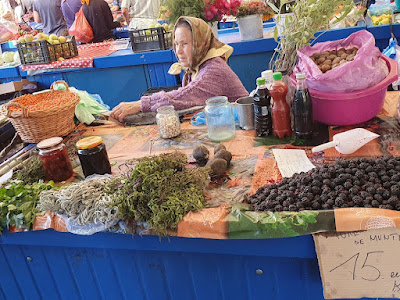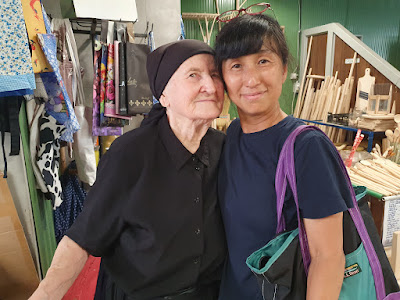Pictured above is a plate of iahnie de fasole cu ciolan afumat. Stewed white beans with smoked pork hock. It is one of the most radically non-kosher foods existing in the universe. It is also one of the most delicious. Similar dishes may exist elsewhere in the world, but iahnie de fasole with smoked pork is decidedly Romanian. You can't get this in Hungary, or in Serbia, or even in pig loving Austria or the Czech republic, which boasts the highest per capita consumption of pork in the world. Only in Romania. And in Romania, you can get it in nearly every restaurant, where it is usually the most expensive dish on offer, and still clocks in at under USD $10. It had been too long since I had been to Romania to enjoy its swiney delights... so this summer we made plans to meet up with Zoe Aqua and Jake Shulman-Ment, two of my close associates in the world of old style Jewish fiddling, to drive around the porkier parts of Romania visiting some of the older fiddlers. As fate would have it, our small party expanded into a small safari as six other friends joined the caravan, but somehow we managed.
 |
| Neolog Synagogue, Oradea, Romania |
We started out just across the border from Hungary in the city of Oradea, (known as Nagyvarád in Hungarian.) Once a grey and dusty border outpost, Oradea has spent the last few years using its European Union funding to spruce up and attract foreign investment. I was literally shocked at how magnificent the city had become, with several pedestrian streets lined with carefully restored old buildings filled with outdoor cafes and shops. But we were in Oradea to hop out to its suburban villages. In nearby Cihei lives Marius Mihuț, a maker of the vioara cu goarne, a resonator fiddle unique to the Bihor region of northern Transylvania.
Zoe was there to purchase a vioara from Marius, and every time we visit him he and his sister like to make a party of it. First, there was wild boar goulash made over an open fire in the backyard, followed by home made salami and home brewed palinka de prune, plum brandy. This is the reality of doing ethnomusicological "field collecting." You end up with wonderful, insanely generous new friends in places you would never expect. Also, amazingly great fiddle music.
Vioara cu goarne remain a popular instrument for weddings and celebrations around Bihor county, because it is loud enough to be heard over crowds at events such as football matches, where the local identity of the instrument dovetails perfectly with the local Oradea football team (by which I mean soccer for all you Americans...)
The demand is such that Marius keeps quite busy churning out these hand made fiddles. The horn is attached to the body through a small reonator device set beneath the bridge and strings, rather like the metal resonator on a National Steel or dobro guitar, but in miniature. A more developed tone can be made by using the resonating device cannibalised from old phonograph players, particularly the Czech Suprahon brand, which Marius collects by being in touch with antique phonegraph collectors on ebay.
 |
| "Bobby" the deer with Fumie and Zoe |
Did I metion that Marius keeps a pair of tame deer as house pets? Yes he does. Bobby and Bambina. He's raised them since they were orphans found by some local hunters. They walk around the farm in back and seem to think they are just another one of the goats. He also has a couple of baby wild boar. I'm pretty sure those will not end up as house pets, though. The goulash is just too tempting.
 |
| The Status Quo Ante Synagogue in Marosvásárhely |
With a few days to spend before we traveled to Maramures, Fumie and I decided to see Tărgu Mureș, (Marosvásárhely in Hungarian.) For some reason, I have never actually stayed in this traditionally Hungarian speaking city, (today about about 50% use Hungarian and the language has official status) although a lot of my acquaintances in Budapest hail from here. I, personally, base myself in Cluj (Kolozsvár) when I am in Transylvania, and for some reason I haven't ever had a big reason to spend any time in Marosvásárhely. It is, however, off the tourist circuit and that meant hotel prices were cheap, and so was the food pictured above, the iahnie de fasole cu ciolan afumat from the Laci Csarda around the corner from our pensiune.
 |
| Herbal teas, fresh berries, and jams |
The thing to do in any town in Romania is to visit the local open market. We were there in time for summer produce to be piled up in small mountains. People will preserve fruit and make huge amounts of vineta and zakuska eggplant spread for use later in the year.
 |
| Mountains of egplant |






